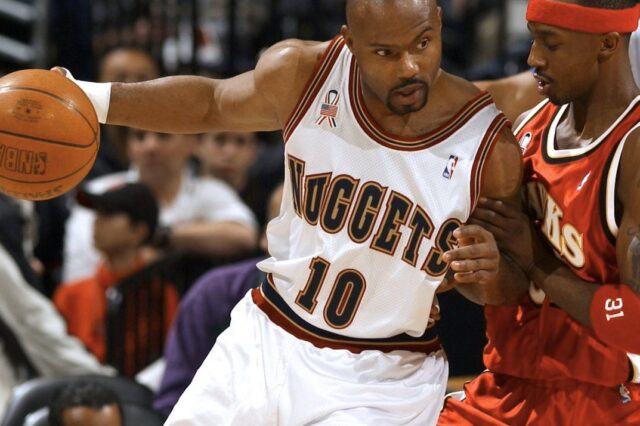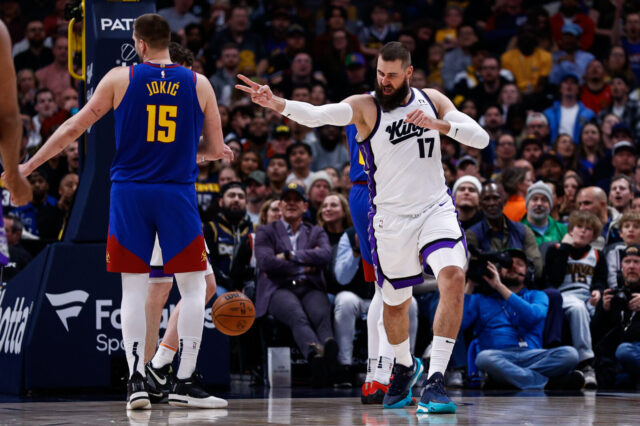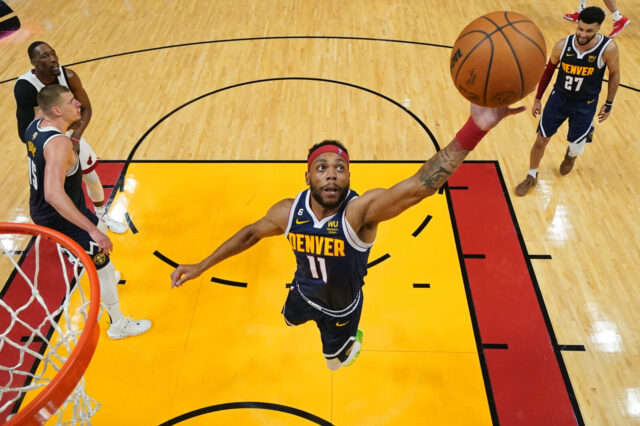Despite finishing the 2019-20 regular season 11th in opponent points per game (109.2) and 16th in defensive rating (111.4), the Denver Nuggets’ defense in the seeding games and postseason was alarmingly bad.
A large reason for the Nuggets’ defensive miscues in the seeding games was their lack of chemistry and experience. Denver was missing two starters, Gary Harris and Will Barton, for all of them. As a result, heavy minutes would be played by two rookies (Michael Porter Jr. and Bol Bol) and two players (P.J. Dozier and Troy Daniels) that had played 22 total games for the Nuggets combined prior to the season restart.
As you might suspect, that’s hardly a recipe for success.
However, other issues that plagued the Nuggets were indefensible. Nikola Jokic, the team’s leader heading into the playoffs, often appeared to vacillate between playing hard and not caring. Rim-protection was optional. There was little to no physicality, as opposing teams routinely got to their spots and had open shots behind the line.
The end result was Denver allowing 123.3 points per game in the seeding games (which was only better than two teams invited to the bubble) and a defensive rating of 121.7 (the worst in the NBA). Somehow, the Nuggets also allowed opponents to convert an insane 44.8% of their 3-point attempts in that eight-game span.
Exposed early in the playoffs
By the time the playoffs started, Denver’s defensive shortcomings were an open secret and the Utah Jazz wasted no time exploiting it. They routinely attacked the Nuggets off-the-dribble, testing the team’s lack of rim-protection while Denver’s coaching staff did nothing to stop their bigs getting switched onto guards.
Porter, while being one of the players the Jazz targeted, was no different than Jokic, Paul Millsap or even Jerami Grant when it came to being victimized by Utah’s strategy. The return of Harris was ultimately beneficial because it allowed the Nuggets to use a guard as a defensive weapon that was athletic as Utah’s Donovan Mitchell. Still, in the first round Mitchell averaged 36.3 points per game while seemingly being guarded by every Nuggets player.
According to NBA.com’s matchup data, Grant was his primary defender (approximately 32 minutes), allowing Mitchell to shoot 18-35 (51.4%) from the floor and 10-18 (55.6%) from three. While guarding Mitchell for a total of approximately 10 minutes, Jamal Murray allowed Mitchell to shoot 15-21 (71.4%) from the field and 6-10 (60%) from three.
Jokic and Porter had absolute no chance of stopping Mitchell, who scored 33 points on them apiece in 11 minutes. With these two as his primary defender, Mitchell was a combined 25-48 (52.1%) from the field.
The Joker was also having predictable struggles against the more athletic Rudy Gobert, who averaged 16.9 points per game in the first round. In the 64 minutes he was matched up against Gobert, Jokic allowed the Frenchman to shoot 25-37 (67.6%) from the field and score 52 points in a series that put to question his defensive effort and leadership.
Gary Harris’ impact
Denver’s defensive focus got better incrementally in the first round. Nonetheless, it was the change in personnel — in other words the return of Harris — that likely saved them from a first-round exit. Although Harris has been inconsistent offensively throughout his career, he’s long been considered one of the league’s better perimeter defender, thanks to his quick hands, defensive instincts and dedication to making plays on that end.
Harris is only credited with four minutes of being being Mitchell’s primary defender but in that time, Spida wasn’t getting shots up at will, just 1-2 from the field. The same goes for Jordan Clarkson.
Though Clarkson averaged 16.7 points per game against the Nuggets, in the six minutes that NBA.com’s matchup data has Harris as Clarkson’s primary defender, the trigger-happy sixth man went 0-1 from the field. Compare that with Grant, Porter and Jokic, who allowed Clarkson to shoot a combined 21-37 (56.8%) from the field when matched up against them.
Monte Morris, whose defense was off-putting as any player’s, allowed Clarkson to shoot 9-16 (56.3%) from the field when he was the primary defender in just 8.5 minutes. Just for the record, Mitchell went 7-14 from the field in the five minutes he was guarded by Morris.
Significant improvement in the semis
In the Western Conference semifinal round against the Los Angeles Clippers, the Nuggets’ defense was much better than it was against the Jazz. Part of that is due to the fact that they weren’t facing backcourt players that could exploit their defense with the ease of Mitchell and Clarkson; the Clippers’ scoring duo of Kawhi Leonard and Paul George were much more methodical and less shifty. In addition, the screen-setting in this series didn’t appear to be nearly as frequent or effective, continuing to reduce the amount of physical mismatches that Denver had to face.
Nonetheless, the decision to start Grant over Porter primarily paid it’s dividends in this round, as the team’s rotations and weakside defense were much more crisp; a byproduct of Grant’s fluidity, experience and awareness when compared to Porter.
In fact, it was Grant’s ability to make Kawhi have a substandard series — using his length to contest shots and playing physically to close out airspace — that allowed them to pull off the upset. After scoring 27.1 points per game in the regular season on a true shooting percentage of 58.9, Leonard averaged 24.3 points per game on a true shooting percentage of 54.8 against the Nuggets in the postseason.
When matched up against Grant, who was Kawhi’s primary defender for more minutes (47) and more possessions (176.2) than any other player in the playoffs, the two-time Finals MVP shot 27-59 (45.8%) from the field and turned the ball over five times against him. Yet, other Nuggets held their own against Leonard as well, with Harris, Millsap and Torrey Craig holding Kawhi to a combined 16-43 (37.2%) from the field.
Continually to play with grit
The Nuggets found yet another way to improve defensively in their Western Conference Finals series against the Los Angeles Lakers while maintaining the formula they found on that end.
Harris played lockdown defense on Danny Green, making the sharpshooter all but invisible as he was held to 1-7 shooting from the field (14.3%) and 1-5 shooting from 3-point range against the Nuggets when G’ was his primary defender.
LeBron James scored 38 points against Grant, more than any other player this postseason, but the 30 minutes and 114.1 possessions that Grant was his primary defender were more than any other player as well. In those minutes, James shot 15-32 (46.9%) from the field after shooting 49.3% from the field in the regular season.
Anthony Davis, who was arguably the most impactful player in the Western Conference Finals, shot 15-23 (65.2%) from the floor and earned 10 free-throws when being defended by Jokic in just 12 minutes. AD shot 6-11 (54.5%) from the field and took 8 free-throws when guarded by Grant from 12 minutes.
However, when Millsap was Davis’ primary defender, The Brow went just 9-30 from the floor. Millsap’s girth, toughness and physicality was quite the juxtaposition from Davis’ tendency to use finesse instead of force and it worked in Denver’s favor.
Defense remains an issue
Yet, despite the Nuggets finding ways to slow down key Lakers players, they still lost in five games. How?
The primary issue, incidentally, comes back to defense. Of course, Game 1 saw Denver lose gas at the end of the game after a short turnaround from a second straight seven-game series. That’s understandable.
However, due to a defensive miscue in the closing seconds of Game 2, the Nuggets lost a nail-biter after Davis hit a game-winning three. In Game 4, despite LeBron shooting an uncharacteristic 38.9% from the field, they were unable to secure key defensive rebounds that led to second-chance points; outscored by six points, they gave up 12 offensive rebounds.
They were unable to complete a comeback in Game 5 because their star players didn’t have what they needed offensively. However, they had already allowed James to shoot 15-25 from the field and Davis to shoot 8-16 from the field on their way to scoring a combined 65 points in a must-win game.
I would be remiss not to at least mention that they were a fair amount of questionable personal fouls called against the Nuggets that led to either Denver’s best players (namely Jokic) having to sit with foul-trouble or to the Lakers shooting free-throws. These calls (or, sometimes, lack of calls) helped swing the game in Los Angeles’ favor.
Nonetheless, it was the defensive end that deserves the most blame.
There’s no way that Rajon Rondo should be able to consistently get to the rim or knock down 45.5% of his 3-point shots. There’s no way that the defense should constantly be out of position to secure a defensive rebounds, particularly in critical moments of the game. There’s no way that Kyle Kuzma should be shooting 47.5% from the field or that Kentavious Caldwell-Pope should be shooting 44.0% from three.
In those areas, Denver dropped the ball and got bounced from the playoffs because of it.
Causes for concern?
Moving forward, the Nuggets’ defense could be in trouble.
Three of their better defenders — Grant, Millsap and Craig— will become free agents this offseason; at least one of Grant and Millsap appears unlikely to return to the team for financial reasons. That said, with Millsap only getting older and his age starting to catch up with him physically, there’s a reason to question how effective he’ll be defensively moving forward.
Next season, Will Barton — a solid defender — will return to the group and there’s a good chance he’ll start beside Harris on the wing. However, both players have shown themselves to be injury-prone. Next time around, Denver will need a backup plan in case one or both of them are unable to suit up for important games.
Regarding Barton and Harris, there are also speculation that one or both of these players could be traded in the pursuit of a star-level shooting guard. Should such a move happen, it only creates more questions about the team’s defense.
Although it’s not often discussed, Morris gets beat off-the-dribble far too often and his defense arguably needs as much improvement as Porter’s. As two of the team’s important young players, will they make the strides they need to make on the defensive end in the offseason and beyond?
Lastly, while Jokic can do well defending players in a box, his effort, physicality and athleticism have often left plenty to be desired. In terms of effort, he has to fully embrace leading by action and not being a part-time leader. Physicality is also a matter of mindset. He’ll never be an elite athlete but he can continue to but the work in on his body to maximize his physical capabilities.
The question is, will he do it?
Until the Nuggets’ prioritize defense, both collectively and individually, their ceiling will be capped. That’s not even to say that Denver can’t win an NBA championship with an offensive-lean but when is the last time anyone saw a dynasty team that didn’t hang their hats on the defensive end?
And, sure, nobody said that the Nuggets want to be a dynasty but isn’t that the point of being a professional sports franchise? To be recognized as the most dominant team there is in the league, year after year?
Denver has the offensive players to make that a reality but, so far, the defense has been found wanting.


